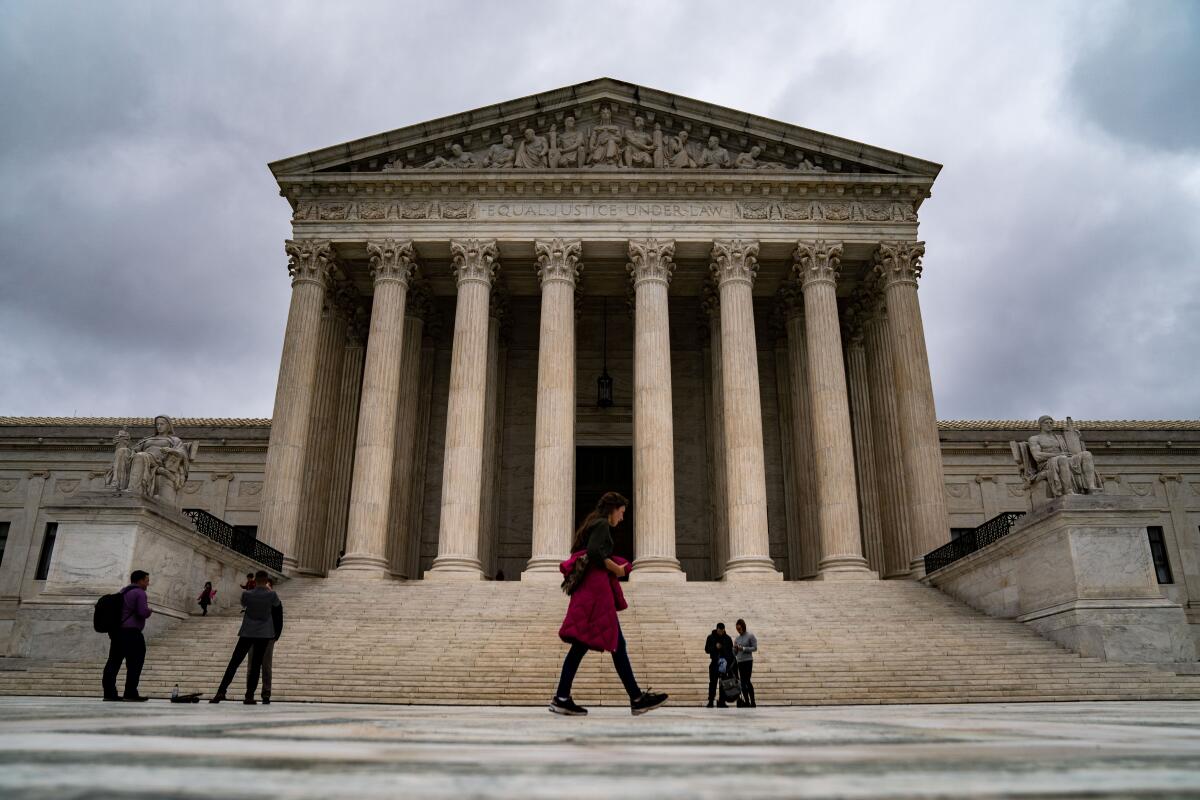Supreme Court agrees to decide on Biden’s stalled student loan forgiveness plan

- Share via
WASHINGTON — The Supreme Court on Thursday refused an emergency appeal to immediately revive President Biden’s student loan forgiveness plan, but agreed to rule early next year on its legality.
The justices left in place an appeals court ruling that has put the program on hold.
The decision is a temporary setback for the administration but not a defeat for its plan to forgive student loans of up to $20,000 for as many as 20 million borrowers.
Anticipating such a move by the court, the administration last week extended its pause for borrowers to resume making monthly repayments, at least until June 30.
By then, the high court will likely have handed down a ruling.
But Biden and his administration’s lawyers face an uphill battle with a conservative court that is skeptical of government agencies claiming a broad power that was not clearly approved by Congress.
At issue is whether the COVID-19 pandemic and the national emergency declared by then-President Trump in March 2020 authorizes the Department of Education to go beyond its pause in repayments and forgive some or all of the student loans held by those earning less than $125,000 a year or up to $250,000 for a married couple.
Twice in the last year, the court’s conservatives rejected Biden’s use of the pandemic to extend his regulatory powers.
The justices in a 6-3 decision ended a nationwide moratorium on housing evictions and said it “strains credulity” to believe Congress had given such authority to the Centers for Disease Control and Prevention.
They also struck down a Department of Labor rule that would have required large employers to enforce vaccine mandates for their employees.
The administration’s student loan forgiveness plan is based on the Higher Education Relief Opportunities for Students Act of 2003, or HEROES Act, which Congress adopted without debate shortly after the start of the Iraq war.
It said the education secretary may “waive or modify” a student aid program if “necessary in connection with a war or other military operation or national emergency.”
The aim was to ensure that “affected individuals” such as soldiers and National Guard troops “are not placed in a worse position financially” from being called to serve. Their loans were not canceled.
The law also said an “affected individual” includes anyone who “resides or is employed in an area that is declared a disaster area by any federal, state, or local official in connection with a national emergency.”
Administration lawyers argued that those who live in the United States or abroad qualify as an “affected individual” under the law because the COVID-19 pandemic is global in scope.
Six Republican state attorneys sued and argued that Congress never authorized the government to forgive student loans at a cost of more than $400 billion, according to the Congressional Budget Office.
They cited House Speaker Nancy Pelosi (D-San Francisco), who last year said “it would take an act of Congress, not an executive order, to cancel student loan debt. People think that the president of the United States has the power of debt forgiveness. He does not. He can postpone. He can delay, but he does not have that power.”
Bills were introduced in Congress to authorize loan forgiveness, but no action was taken on them.
A question facing those attempting to block Biden in court is whether they have legal standing. It was not certain that any person or states could claim they had standing to sue because they would be harmed by the president’s plan to forgive some loans.
Taxpayers who object to a spending program do not have standing, and several suits were dismissed for that reason.
Lawyers for Republican-led states argued that the state agencies that handle student loans will have reduced revenue if large numbers of loans are erased, and this in turn will reduce the state’s revenue.
A federal judge in St. Louis dismissed the states’ claims based on a lack of standing, but the 8th Circuit Court of Appeals disagreed and issued a nationwide injunction that put Biden’s plan on hold.
In a 3-0 decision handed down on Nov. 14, the judges cited the Missouri Higher Education Loan Authority, which faces “an unanticipated financial downturn” and “presents a threatened financial harm to the state.”
Four days later, U.S. Solicitor Gen. Elizabeth B. Prelogar filed an emergency appeal asking the Supreme Court to set aside the injunction and allow the Education Department to begin forgiving student loans. She said the states do not have standing to sue because their claims rest on “pure speculation” about future revenues.
She argued in Biden vs. Nebraska that the president’s “plan falls squarely within the plain text” of the law. “Indeed, the entire purpose of the HEROES Act is to authorize the [education] Secretary to grant student-loan-related relief to at-risk borrowers because of a national emergency — precisely what the secretary did here.”
Rather than decide solely on whether to allow the forgiveness plan to proceed while lower courts heard the dispute, the Supreme Court now will take the case directly, with arguments set for February.
“We welcome the Supreme Court’s decision to hear the case on our student debt relief plan for middle- and working-class borrowers this February,” said White House Press Secretary Karine Jean-Pierre. “This program is necessary to help over 40 million eligible Americans struggling under the burden of student loan debt recover from the pandemic and move forward with their lives.”
More to Read
Get the L.A. Times Politics newsletter
Deeply reported insights into legislation, politics and policy from Sacramento, Washington and beyond. In your inbox twice per week.
You may occasionally receive promotional content from the Los Angeles Times.











